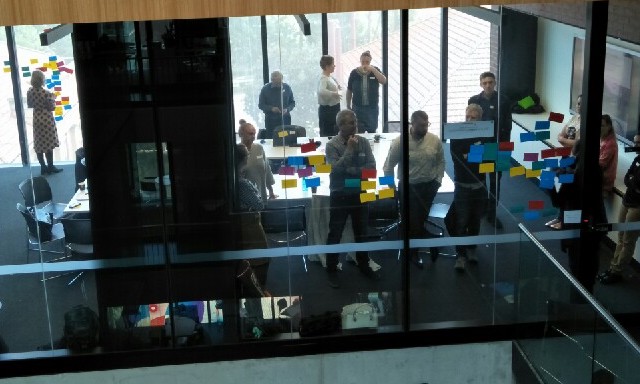Wetland Productivity Workshop - Partnership with DEW and University of Adelaide
Guest post and images by Dr Jasmin Packer, Research Fellow of the Environment Institute with the School of Biological Sciences.
Enter Jasmin: Many thanks again to the Environment Institute for sponsorship of last week’s UoA-DEW Wetland Productivity Workshop.
Workshop aim: The workshop aimed to bring together DEW’s wetland management experts with UoA to define productivity for River Murray wetlands, identify the indicators, potential management actions, and constraints for managed wetting and drying.
Date: Thursday 8 Nov 10-3 pm
Where: Braggs Building 313-314 (space worked brilliantly yet again! Thank you, Toni)

Who: Attended by 14 invited reps from DEW, UoA, and independent experts. DEW wetland management experts from along SA’s River Murray corridor, DEW Riverine Recovery Project team, independent wetland experts, and UoA researchers from Acid Sulfate Soils UoA-RRP project led by Dr Luke Mosley (microbial component led by Assoc Prof Tim Cavagnaro; productivity component led by Dr Jasmin Packer.)
The workshop was a great success – we achieved the workshop aims, and had lots of fun strengthening the partnerships within DEW (Department of Water and Environment) and between DEW and UoA. Many thanks to EI’s generosity for enabling a picturesque soiree to cement the workshop outcomes – and send everyone home to their wetlands.

The workshop was facilitated by Dr Jasmin Packer (UoA EI) and Dr Sally Maxwell (DEW RRP, and UoA PhD Alumni).

Funding: this project is one of 5 Investigations funded through DEW’s Riverine Recovery Project. It is UoA’s major project in partnership with the Riverine Recovery Project .
Enter Jasmin: Many thanks again to the Environment Institute for sponsorship of last week’s UoA-DEW Wetland Productivity Workshop.
Workshop aim: The workshop aimed to bring together DEW’s wetland management experts with UoA to define productivity for River Murray wetlands, identify the indicators, potential management actions, and constraints for managed wetting and drying.
Date: Thursday 8 Nov 10-3 pm
Where: Braggs Building 313-314 (space worked brilliantly yet again! Thank you, Toni)

Who: Attended by 14 invited reps from DEW, UoA, and independent experts. DEW wetland management experts from along SA’s River Murray corridor, DEW Riverine Recovery Project team, independent wetland experts, and UoA researchers from Acid Sulfate Soils UoA-RRP project led by Dr Luke Mosley (microbial component led by Assoc Prof Tim Cavagnaro; productivity component led by Dr Jasmin Packer.)
The workshop was a great success – we achieved the workshop aims, and had lots of fun strengthening the partnerships within DEW (Department of Water and Environment) and between DEW and UoA. Many thanks to EI’s generosity for enabling a picturesque soiree to cement the workshop outcomes – and send everyone home to their wetlands.

The workshop was facilitated by Dr Jasmin Packer (UoA EI) and Dr Sally Maxwell (DEW RRP, and UoA PhD Alumni).

Funding: this project is one of 5 Investigations funded through DEW’s Riverine Recovery Project. It is UoA’s major project in partnership with the Riverine Recovery Project .

Newsletter & social media
Join us for a sensational mix of news, events and research at the Environment Institute. Find out about new initiatives and share with your friends what's happening.
